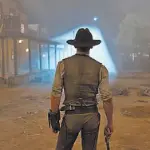The summer movie season is on, and I have not taken much time to enjoy it. The are some good films playing in theatres, and I usually volunteer with at least one film festival, but financial concerns have changed the script. I am falling back into old routines with my guitar, books and memories. Nostalgia can be a gift or a burden, and that is why I am looking back at a film that I only came upon by chance as a teenager: Shoot the Piano Player.

This was Francois Truffaut’s second major film after he debuted as a New Wave contender with The 400 Blows (1959). I found it out of desperation for a film to rent from the local library. The most popular films of the time were never available. That left only foreign films or obscure titles that no one else wanted to rent. There was Kurosawa, Bergman, Ozu, even Robert Altman (Nashville was a real surprise). And this classic.

The film is based on the David Goodis book of the same name, and it is wonderful balance of comedy, drama, and tragedy, all wrapped up in a rather warped take on the pulp fiction of the novel. Charles Aznavour plays Edouard Saroyan, introduced to us as Charlie, a pianist in a rundown bar in Paris who finds that he cannot escape his past, especially when his brother shows up and gets him involved with a crime they’ve committed (gangsters robbing gangsters). It is clear from Charlie’s manner, talent, and the response of the women around him that he should be performing in concert halls and perhaps have at least one record under his name. But life does not always play favourites, and the story of why he ends up hitting the ivories is played out for us.
But there is the audition…
In a prolonged set of flashbacks, we get to see Charlie by his real name receive a very lucky break when a music impresario, Lars Schmeel, sees him with his wife in a café where she is waitressing. He apologizes for blowing off Edouard the first time they met, and decides to give him an audition. This is the beginning of a turn in his career, and also his downfall. But I want to describe the scene that still haunts me.
We see Edouard mount the steps of a building to his audition, soon to be in a hallway where we hear nothing but a violin being played as he desperately searches for the correct office. Then, at the door, he hesitates, and Truffaut uses a brilliant series of shots and close ups of Edouard about to use the handle, and three separate moments to note his finger hovering by the doorbell. And just before he decides to leave, we see a woman leave that office. She has been the source of that music and is talented, but then she hears Edouard on the piano. The camera follows, pauses, follows and then cuts to Lars’ latest acquisition in a tuxedo performing for the proper crowd.
Why does this move me? The sense of loneliness you feel in that hallway as he attempts to locate the office is palpable. The woman leaving the office with nothing but haughty indifference towards him is also vivid and painful to watch (not a single word is exchanged between them; they barely look at each other). I find it incredibly moving and real, and it taught me the importance of chance, sound and how one non-verbal moment in a movie can teach more about the human condition than an endless piece of monologue.
If you have not seen the film, find it, love it, and learn from it. Truffaut’s second film will not disappoint.


































View replies 1
View replies 1
View replies 1